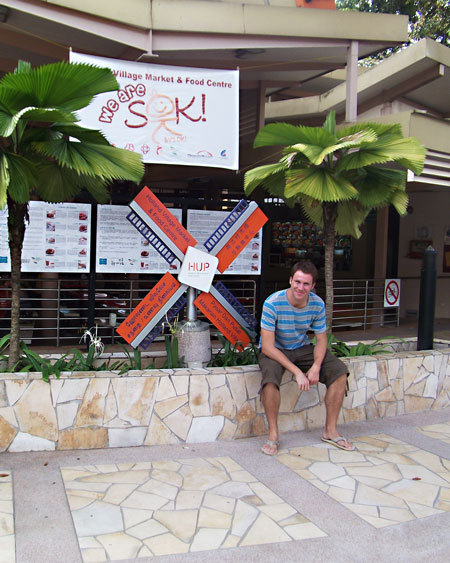For almost three months I've been doing my internship in Singapore, at the Agency of Science, Technology And Research, A*STAR. This is a government organization that has institutes and daughter organizations in most science and engineering disciplines. It's comparable to TNO in the Netherlands.
I got to be part of on a project called 'Value Added Chemicals from Lignocellulose', which aims to acquire useful chemical compounds from woody plant materials or organic waste, and to develop routes for further downstream processing of these compounds towards useful applications. Since this project involves a chain of knowledge from several disciplines, R&D is carried out at three of the A*STAR institutes in the fields of chemical engineering, material science and manufacturing technology. I worked in two of these institutes on blending of the bio-based polymer poly(lactic acid), combining commercial materials and custom synthesized materials to get improved material properties.
Singapore itself is a very modern city in facilities and infrastructure, and might appear western at first, but it's not. You can find all nationalities, religions, clothing, customs and types of food you can imagine (the main stream being Chinese, Malay and Indian). Therefore there is a lot to do in enjoying cultural variety, but when working together it can also give some communication difficulties; people treat each other differently dependent on where they're from. Luckily the majority is Chinese, so I didn't have to switch all the time.
I started out in Singapore at a hostel. Both getting started with the project at the two institutes and getting settled as a resident were somewhat challenging, especially bureaucratically. Registrations, check-ups, trainings, passes, accessibility, and finding the right places and people all took quite some time. In work I noticed that if you're labeled 'student' your freedom is pretty limited, but I had a lot of help from my supervisor who has a higher position in the corporate hierarchy. Though challenging, finding my own way also allowed me to meet a nice variety of people -(PhD) students, locals and expats from different backgrounds- which was welcome because at the beginning I was the only non-Asian of my age at work, and as an intern you're not really a student but also not really an expat.
Once I found a place to stay and got through the start-up period, I faced some long working days, mainly because of the location of the chemical engineering institute which required 2,5 hours of travel each day -if you were lucky with traffic- resulting in leaving the house at 7 am and returning 7 pm.
Both the working rhythm and the high level of regulation in Singapore can get a bit confining sometimes, but luckily I got some free time to escape to other countries in South East Asia which are usually a bit more chaotic. At this moment my internship nears its end, within two weeks I'll be back in the Netherlands.
Jesper van Berkel, student Scheikundige Technologie

|



